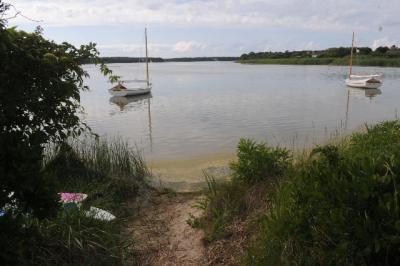Trustees Issue Georgica Pond Warning

After detecting heightened levels of blue-green algae during routine testing of Georgica Pond, the East Hampton Town Trustees agreed Thursday evening to temporarily prohibit shellfishing or fishing in the pond and have advised those who use the pond to take precautions when doing so.
"While the toxins at this site are at low levels, preventative measures for all users of the pond should include not swimming or wading near blooms of surface scum, not drinking the water, keeping children and pets away from blooms and scum, [and] rinsing with clean water if exposed," the trustees wrote in a letter to the Georgica Pond Homeowners Association, baymen, and the general public.
Last year, the trustees began testing for water quality and toxic algal blooms in Georgica and other town water bodies. "The results in 2013 had no high levels of toxicity" in Georgica, the trustees wrote Thursday. "However, as of today, July 24, 2014, one sample from Eel Cove tested slightly above the New York State Department of Environmental Conservation level for 'blue-green' algae."
In D.E.C. testing this year, blue-green algae blooms have also been found in Big Reed Pond in Montauk and Lake Agawam and Wickapogue Pond in Southampton, the latter of which had a high level of toxins at the last D.E.C. sampling on July 15, according to the agency's website.
Blue-green algae is the common name for cyanobacteria, which "are naturally present in lakes and streams in low numbers," according to the New York State Department of Environmental Conservation, but can form harmful algal blooms under the right conditions, typically in "nutrient-rich waters" during "hot, calm weather." They produce "toxins that can be harmful to people and animals," the D.E.C. says. Cyanobacteria can "discolor the water or produce floating rafts or scums on the surface of the water," according to the website for the New York State Department of Health.
While there is no data confirming that shellfish, such as crabs, or other marine species in the pond would be affected by the bloom or that consuming that shellfish or fish would be unsafe, the trustees "determined it is in the best interest of the public" to close the pond to shellfishing and fishing until at least Aug. 12.
"Rest assured," the trustees' letter says, "mitigation and/or removal practices are and will continue to be discussed by the board of trustees. Unfortunately, there is no quick fix for the toxic or macro algae blooms. However, although no direct link has been defined yet, we encourage all home and property owners surrounding the pond to look at their own upland practices (i.e. aging septic systems, fertilizer use, lack of natural shoreline vegetation) to reduce the risk and potential for blooms in the future."
